Topic: Committee leadership
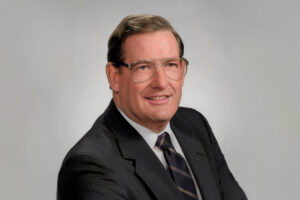
Interview of Carl Holmes, September 3, 2020
Interviewed by Rex Buchanan
In this 2020 oral history interview, former State Representative Carl Holmes discusses his observations of state water policy formulation in the 1970's through 2012. Holmes began his involvement in water policy as a farmer and active member of his community in southwest Kansas. In many respects, his experiences reflect the water-energy nexus. Holmes describes how he had observed cities and irrigators mining water in southwest Kansas. He recalls developing a comprehensive understanding of water issues by interviewing the managers of the state’s water resources. In this interview, Holmes describes how he managed the House Energy and Natural Resources Committee by Show Morecreating subcommittees and educating members on how to work bills and guide them through the process. He discusses his bipartisan work with Representative Ken Grotewiel and other committee Democrats in the 1990s, actions that resulted in the Speaker removing him from the chairmanship of the committee. Holmes describes how irrigation changed over time from flood to sprinklers and how the sprinkler systems have become more efficient. However, Holmes observed that groundwater levels continue to decline leading to abandoned wells, the growing of crops that require less water, the return to dryland farming, and, for some, the call for diversion of water from distant sources, such as the Missouri River, to sustain farming and communities on the plains. Show Less
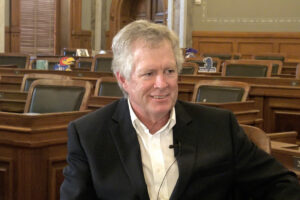
Interview of Dennis McKinney, August 23, 2019
Interviewed by Dale Goter
Dennis McKinney developed many insights in his sixteen years as a leader in the minority party into how the legislature did work, and how it should work. He recounts numerous instances when things worked well because of bipartisan cooperation and compromise. McKinney's experiences on the House Energy and Natural Resources committee working with Carl Holmes and Ken Grotewiel helped shape water policy in Kansas. His experience as a farmer and rancher in south central Kansas coupled with his focus on problem solving led to his reputation as a "middle of the road legislator" who would work Show Morewith both political sides as well as urban and rural. McKinney was committed to public education as well as conservation. The pursuit of fair and balanced tax policy shaped his actions. The interview highlights the importance of leadership from the governor's office and other legislative leaders (Mays, Shallenburger, D. Kerr, Morris). There is an interesting segment about the 2005 Special Session on school finance where McKinney talks about using the courts as leverage. The interview concludes with a brief discussion of the Greensburg tornado. Show Less

Interview of Robert (Bob) Miller, November 9, 2017
Interviewed by H. Edward (Ed) Flentje
Former Speaker of the Kansas House of Representatives, Robert (Bob) Miller recalls his many years of service to the State. He describes his involvement with the Young Republicans at K-State, his first campaign to represent his area of Sumner County, and moving up through the ranks in the House despite not having ambition for any other elected position. Miller reflects on his sometimes arms-length relationships with fellow House members and with lobbyists. From his position as chair of the House Federal and State Affairs Committee he oversaw the development of implementing legislation for liquor-by-the-drink, parimutuel wagering, and Show Morethe State Lottery by building subject-matter expertise within the committee. Miller describes instances when legislators' positions on policy issues did not break along purely partisan nor on purely urban-rural lines. He also witnessed the early development of what eventually became the conservative movement in the Legislature.
A version of this interview is also posted on KansasMemory.org, the website of the Kansas Historical Society. Show Less
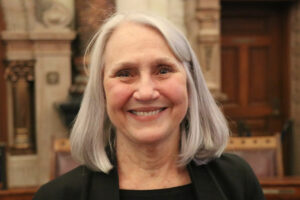
Interview of Nancy Parrish, October 23, 2020
Interviewed by Patty Clark
This 2020 oral history interview of former State Senator Nancy Parrish is packed full of information about people and policy between 1980 and 1992 in the Kansas Senate. She was one of the first, if not the first Democrat women elected to the state senate. Parrish talks about establishing her own identity after filling the unexpired part of her husband's term and winning the seat three more times while fostering a child, adopting a child, and attending law school at Washburn University. Her relationships with Republican senators allowed her to be effective in passing or shaping legislation. Show MoreParrish served on the conference committee to negotiate the 1992 school finance bill. Parrish also discussed her two years as Secretary of Revenue and working with Senator Gus Bogina to pass legislation to provide for purchase of a large-scale computer system for collecting taxes at the Department of Revenue. Parrish offers opinions on the importance of the separation of powers in the constitution, from her perspective as a former legislator, an executive branch administrator and a judge. For Parrish, each of these experiences has been a learning experience. She concludes the interview by expressing concern about the loss of "camaraderie" among legislators. Show Less
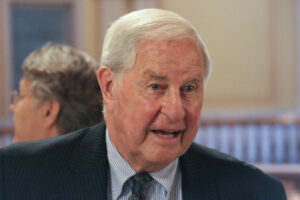
Interview of Robert (Bob) Storey, February 5, 2015
Interviewed by Burdett Loomis
Bob Storey in his 2015 oral history interview recalls his service in the Kansas Senate from 1969-1976. His recollection is of a senate that was in transition in terms of urban-rural influence on policymaking due to the one-person, one-vote principle enunciated by the U.S. Supreme Court in the mid-1960s. He recalls intricacies of interactions among senate leaders and governors and occasional intrigue in senate leadership elections. He also reflects on improvements in the functioning of state government during the years when reorganization and modernization of many state functions took place.
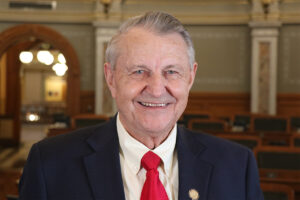
Interview of Richard Carlson, February 9, 2024
Interviewed by Chris Courtwright
Richard Carlson held several important positions in Kansas government --Secretary of Transportation, Chair of the House Taxation Committee, County Commissioner of Pottawatomie County--in addition to being a farmer/cattleman, banker, businessman. In his interview he speaks candidly about his efforts as Tax Chairman to pass and implement Governor Brownback's tax plan of 2012. He acknowledges the plan as finally passed was "unsustainable." In 2016 Governor Brownback appointed Carlson as Secretary of Transportation. His 2-3 years as head of that agency saw a lot of progress in implementing various transportation projects around the state.
